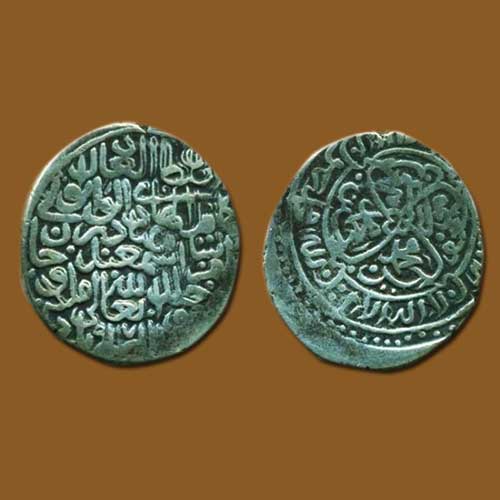Glorious Reign of Shah Ismail I
2020-07-17 Fri
Safavid was one of the greatest Iranian empires and at its height being amongst the most powerful empires of its time. They rule all of present-day Iran, Azerbaijan Republic, Armenia, most of Georgia, the North Caucasus, Iraq, Kuwait and Afghanistan, as well as parts of modern-day Syria, Turkey, Pakistan, Uzbekistan and Turkmenistan.The dynasty founded by Ismail I would rule for over two centuries. He established the Twelver school of Shia Islam as the official religion of the empire. Ismail was also a prolific poet who, under the pen name Kha?a?i (which means "he who made a mistake" or "he who was wrong" in Persian), contributed greatly to the literary development of the Azerbaijani language. During the reign, he issued various coins in gold and silver. These coins are found in the denomination of Shahi, Ashrafi, Mithqal and Tanka.
Depicted here is silver half Shahi issued under his reign from Astarabad min. The Persian legend "Al-Sultan el-'adil el-hadi al-wali abul' muzaffar shah isma'il bahadur khan es-safawi khallad Allah mulkahu wa sultanahu" inscribed on the obverse face of the coin. The reverse of a coin showed the Shiite Kalima ‘La Ilaha Illahu Muhammadur Rasulullah Ali Waliullah’ and names of Bara Imams (12 Imamas).
Image Source: www.vcoins.com
Latest News
-
Malwa Sultan Mahmud Shah Silver Coins
2025-09-11 ThuMalwa Sultan Mahmud Shah minted silver coins in round and square flans. <br><br> For round coins,...
-
Malwa Sultan Mahmud Shah Billon coin
2025-08-26 TueMalwa Sultan Mahmud Shah's billon coins followed three weight standards: 100 rati, 96 rati, and 80 r...
-
Fascinating Archaeological Facts on Postage Stamps - 91
2025-08-23 SatRhinoceros is one of the oldest land mammal species existing in India. There are five species of rhi...
-
Fascinating Archaeological Facts on Postage Stamps - 90
2025-08-23 SatUthiramerur, a Village in Kanchipuram, Tamil Nadu, is notable for its Temple inscriptions that descr...
-
Fascinating Archaeological Facts on Postage Stamps - 89
2025-08-21 ThuThe term “millet” is derived from the Latin word “milum,” which translates to grain. millets...

